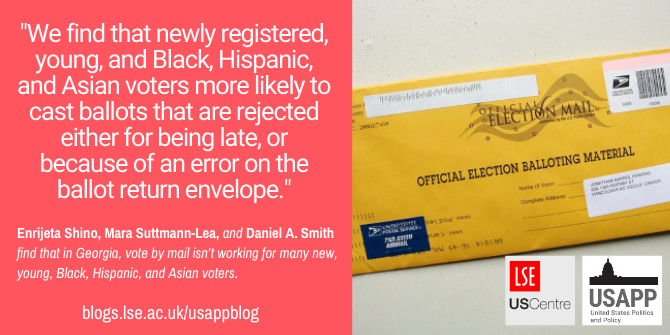

 Georgia has been in the news in recent weeks because of new legislation which effectively restricts the ability of many communities to vote. Using data from the 2018 General election in Georgia, Enrijeta Shino, Mara Suttmann-Lea, and Daniel A. Smith find that ballots from newly registered, young, and Black, Hispanic, and Asian voters were more likely to be rejected by election officials. They write that some of these rejections may be down to individual factors, but also that a lack of voter education and outreach resources for communities with larger populations of racial and ethnic minority voters may equally be at fault.
Georgia has been in the news in recent weeks because of new legislation which effectively restricts the ability of many communities to vote. Using data from the 2018 General election in Georgia, Enrijeta Shino, Mara Suttmann-Lea, and Daniel A. Smith find that ballots from newly registered, young, and Black, Hispanic, and Asian voters were more likely to be rejected by election officials. They write that some of these rejections may be down to individual factors, but also that a lack of voter education and outreach resources for communities with larger populations of racial and ethnic minority voters may equally be at fault.
The state of Georgia is once again in the headlines after the passage of a controversial piece of legislation that, among other changes, makes the requirements for voting by mail more onerous. Voters in the Peach State now have less time to request mail ballots—less than half of what was previously allocated—and there are stricter identification requirements for voters returning ballots. Moreover, election officials can no longer send vote by mail applications to all registered voters, a change necessitated during the 2020 election cycle as election officials looked for ways to encourage socially distanced voting in the midst of the COVID-19 pandemic.
Which voters are more likely to have their vote-by-mail ballots rejected?
Our research, which draws on administrative data from Georgia in the 2018 General Election, prior to the COVID-19 pandemic, is motivated by trying to better understand which voters casting a vote-by-mail (VBM) ballot are more likely to have their return envelopes flagged for rejection by county election officials. Our findings provide insight into how Georgia’s new mail voting laws might affect the state’s voters.
In our peer-reviewed study, we used Georgia’s statewide voter file to gather information on each individual voter’s race, age, gender, and registration status, linking these individual-level data with state-managed data on mail ballots cast during the 2018 midterm elections. These data include information on when a ballot was received, whether it was counted, and if it was not counted, the reason for rejection.
We find that newly registered, young, and Black, Hispanic, and Asian voters more likely to cast ballots that are rejected either for being late, or because of an error on the ballot return envelope. Although our data cannot directly test for the mechanisms that explain these disparities, we suggest there might be both systemic and individual-level factors at play. Young voters and new registrants in the state, both being new to the electoral process, may be more prone to having an invalid signature, or return a ballot late. due to their lack of familiarity with the system. Many young voters live in a Venmo world, after all, and may not be accustomed to writing a their wet – or ‘real’ – signature in a way that is meaningful, much less terribly familiar with the vagaries of the United States Postal Service.
Communities of color are allocated fewer voting resources
However, such individual-level explanations cannot fully explain why younger and minority voters are more likely to cast a ballot that gets rejected for lateness or for a mistake on the return envelope. Equally at play, we suggest, are a combination of disparities in resources dedicated to voter education and outreach, the timely provision of ballots, and the quality of mail services in communities with larger populations of racial and ethnic minority voters. These patterns are in line with established evidence that these communities are allocated fewer resources and face greater bias in their interactions with election administration, relative to white voters.
While our research sheds light into the most common reasons for ballot rejection in Georgia’s 2018 election, there are some limitations to our analysis, given the nature of the data that are available to scholars. Still, our research highlights the importance of changes that could be made to the mail ballot system in Georgia and in other states that can help reduce inequities that exist in ballot rejection rates across different subgroups of the electorate.

“Untitled” by Jonathan S. Igharas is licensed under CC BY NC SA 2.0
To be sure, the story we offer regarding mail voting in Georgia’s 2018 General Election does not necessarily point to explicit voter discrimination, as we do not have individual or contextual explanatory factors that allow us to isolate why certain parts of the electorate have higher rates of mail ballot rejections than others. Future research is needed, likely in partnership with election officials, to directly explore the causal mechanisms that might be driving the disproportionate rates of rejection of mail ballots cast by newly registered voters as well as those who are young and racial and ethnic minorities.
The importance of better outreach
One possible avenue to reduce the disparities across groups in rejected mail ballots is for local election jurisdictions to invest more resources in education and outreach that targets these vulnerable groups of voters. With Georgia’s law, Senate Bill 202, now on the books, newly registered voters will need a boost in civic education from election officials to inform them about the process. But existing voters, particularly those who do not normally vote by mail, will need a primer on the recent changes to Georgia’s election code. Unfortunately, Georgia’s new election law limits opportunities for local election officials to request additional funding from outside groups who can provide resources and expertise for just these types of voter education and outreach efforts. Specifically, under the new law, local election officials are barred from accepting funding from sources outside of their jurisdiction, the state of Georgia itself, and the Federal government. During the 2020 elections, many jurisdictions in Georgia and across the United States received millions in support from nonprofit groups to support their voter education efforts and technical improvements to their election process.
We cannot yet definitively know whether the Georgia law will aggravate the patterns of rejected vote-by-mail ballots that we found in our research in the 2018 midterm elections. It stands to reason, though, that further restrictions that increase chances for voters to make mistakes in the mail voting process—absent extensive voter education efforts—will only worsen the inequities in mail ballot rejections we document in our research.
- This article is based on the paper, ‘Determinants of Rejected Mail Ballots in Georgia’s 2018 General Election’ in Political Research Quarterly.
Please read our comments policy before commenting.
Note: This article gives the views of the author, and not the position of USAPP – American Politics and Policy, nor the London School of Economics.
Shortened URL for this post: https://bit.ly/3swYXsz
About the authors
 Enrijeta Shino – University of North Florida
Enrijeta Shino – University of North Florida
Enrijeta Shino is a political science professor at the University of North Florida. Her research focuses on elections, voting behavior, public opinion, political methodology, and survey statistics. One of the main questions that informs her research agenda is how institutional designs, such as voting laws, affect voter behavior. This theme figures prominently in most of her peer-reviewed articles.
 Mara Suttmann-Lea – Connecticut College
Mara Suttmann-Lea – Connecticut College
Mara Suttmann-Lea is an Assistant Professor of American Politics at the Department of Government and International Relations at Connecticut College, and a fellow with the Social Science Research Council’s Social Data Fellowship. They are also the host of the podcast “What Voting Means to Me.” Dr. Suttmann-Lea’s research focuses on election administration, political parties and campaigns, and political engagement in the United States.
 Daniel A. Smith – University of Florida
Daniel A. Smith – University of Florida
Daniel A. Smith is Professor and Chair of Political Science at the University of Florida. A former Senior Fulbright Scholar in Ghana, he is the President of ElectionSmith, Inc., and has served as an expert witness in dozens of voting rights lawsuits in Florida and across the country. Dr. Smith’s research broadly examines how political institutions affect political behavior across and within the American states. In addition to publishing over 100 peer-reviewed articles and book chapters, he is the author of Tax Crusaders and the Politics of Direct Democracy (Routledge, 1998), Educated by Initiative (University of Michigan Press, 2004), and State and Local Politics: Institutions and Reform (4th edition, Cengage, 2015).






